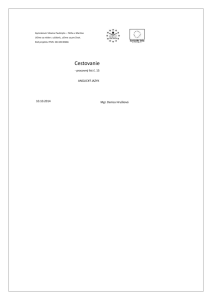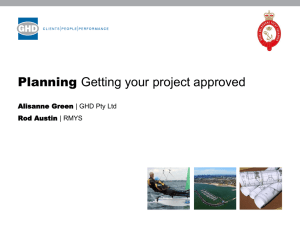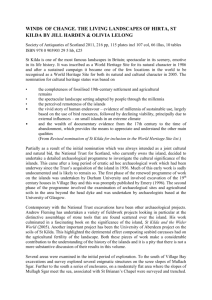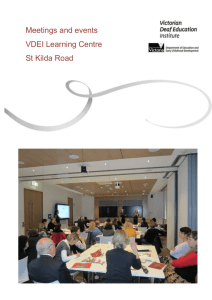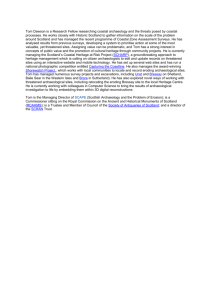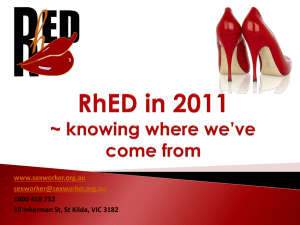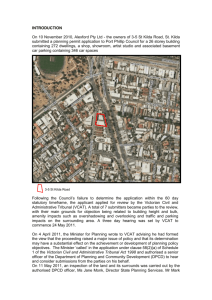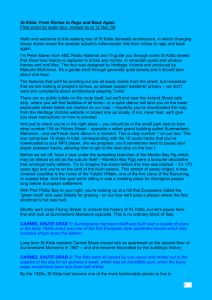Archaeologist,St Kilda Job description Jan16
advertisement
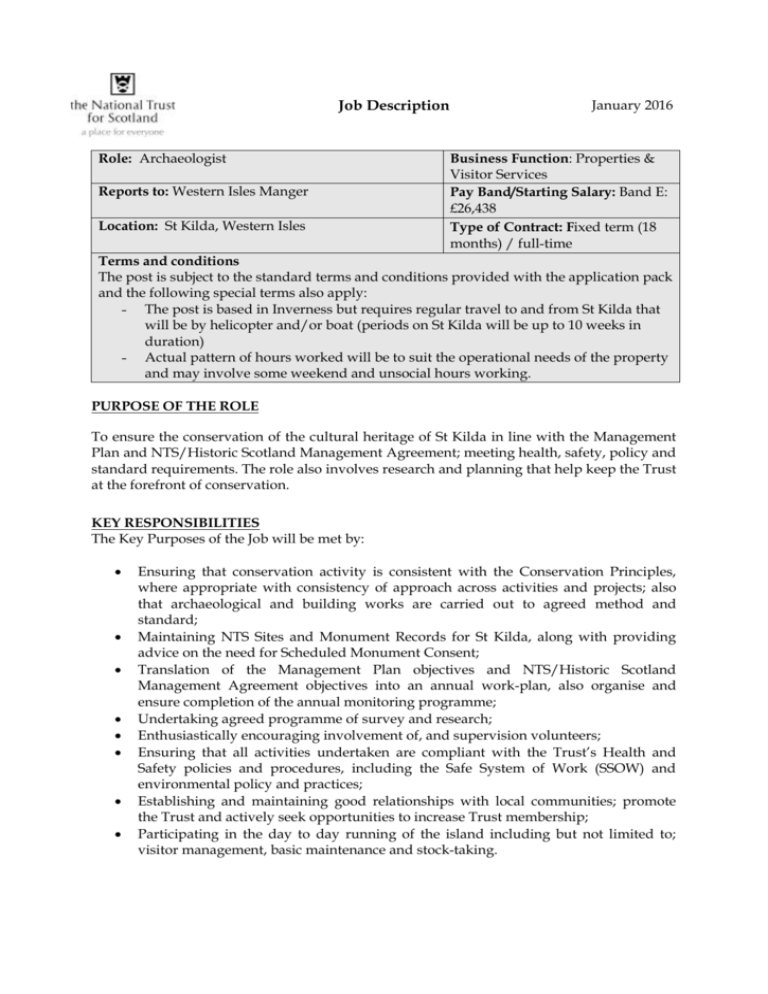
Job Description Role: Archaeologist Reports to: Western Isles Manger Location: St Kilda, Western Isles January 2016 Business Function: Properties & Visitor Services Pay Band/Starting Salary: Band E: £26,438 Type of Contract: Fixed term (18 months) / full-time Terms and conditions The post is subject to the standard terms and conditions provided with the application pack and the following special terms also apply: - The post is based in Inverness but requires regular travel to and from St Kilda that will be by helicopter and/or boat (periods on St Kilda will be up to 10 weeks in duration) - Actual pattern of hours worked will be to suit the operational needs of the property and may involve some weekend and unsocial hours working. PURPOSE OF THE ROLE To ensure the conservation of the cultural heritage of St Kilda in line with the Management Plan and NTS/Historic Scotland Management Agreement; meeting health, safety, policy and standard requirements. The role also involves research and planning that help keep the Trust at the forefront of conservation. KEY RESPONSIBILITIES The Key Purposes of the Job will be met by: Ensuring that conservation activity is consistent with the Conservation Principles, where appropriate with consistency of approach across activities and projects; also that archaeological and building works are carried out to agreed method and standard; Maintaining NTS Sites and Monument Records for St Kilda, along with providing advice on the need for Scheduled Monument Consent; Translation of the Management Plan objectives and NTS/Historic Scotland Management Agreement objectives into an annual work-plan, also organise and ensure completion of the annual monitoring programme; Undertaking agreed programme of survey and research; Enthusiastically encouraging involvement of, and supervision volunteers; Ensuring that all activities undertaken are compliant with the Trust’s Health and Safety policies and procedures, including the Safe System of Work (SSOW) and environmental policy and practices; Establishing and maintaining good relationships with local communities; promote the Trust and actively seek opportunities to increase Trust membership; Participating in the day to day running of the island including but not limited to; visitor management, basic maintenance and stock-taking. The current duties of this job do not require a criminal records (Disclosure Scotland) check to be carried out. SCOPE OF ROLE People Management No line management responsibility but will regularly supervise volunteers; Work closely with on-site Trust staff to co-ordinate work plans and ensure the smooth running of the property; Work closely with specialist Trust staff (e.g. in conservation, health & safety, human resources) located at central and local support bases to ensure Trust policies and standards are implemented; Develop and maintain sound relationships with key representatives of key bodies/organisations who have interests in the islands (e.g. community councils, local businesses, conservation organisations), along with representatives of Historic Environment Scotland, Scottish Natural Heritage and Western Isles Council; Interaction with members of the public of all ages and abilities. Financial Management Not a budget holder but may be asked to contribute to budget discussions; Assist in making the best use of resources and ensuring best value; Contribute to the income of the Trust through increasing membership and through development of income generating opportunities. SKILLS, EXPERIENCE & KNOWLEDGE The above outlines the key skills the job holder will need to possess and exercise. In addition, either knowledge of or experience in the following is required: Essential Degree (or equivalent-level knowledge) in archaeology and/or related subject, and appropriate field experience; Practical archaeology fieldwork skills, Building recording and practical building skills considered as an advantage Willing to work and live on a remote island as a part of a small community; A sound knowledge of issues affecting the conservation and management of Scotland’s cultural heritage; Knowledge of, and interest in the archaeology and history of the Western Highlands and Islands of Scotland; Demonstrable high levels of interpersonal and communication skills and confidence in dealing with a wide range of staff, visitors and other stakeholders; Competent user of Microsoft Office products, including GIS; Ability to manage time efficiently and effectively in an environment of changing priorities. Desirable Practical experience of supervising volunteers. The Key Responsibilities, Scope of Job, and Required Qualifications, Skills, Experience & Knowledge reflect the requirements of the job at the time of issue. The Trust reserves the right to amend these with appropriate consultation and/or request the post-holder to undertake any activities that it believes to be reasonable within the broad scope of the job or his/her general abilities. Applications Interested applicants should forward a completed application form to Human Resources Department (Applications), The National Trust for Scotland, Hermiston Quay, 5 Cultins Road, Edinburgh, EH11 4DF, by mail or by email via workforus@nts.org.uk, by first post (i.e. 10.00am) on Monday, 25 January 2016. Interviews are likely to be held at the National Trust Head Office, Edinburgh on Monday, 8 February 2016. Information Sheet – St Kilda The St Kilda archipelago lies 41 miles west of the Western Isles and consists of 4 small islands and numerous seas stacs, extending to approximately 850 ha. Archaeological evidence suggests that St Kilda has been occupied, perhaps continuously, for over 2000 years. The last native St Kildans left in 1930. In 1957 the islands were bequeathed to the National Trust for Scotland and the whole archipelago was designated a National Nature Reserve. In the same year a military tracking station was established on the main island. Today the islands are the UKs only mixed World Heritage Site, inscribed for both cultural and natural features, including the marine environment. St Kilda is also a Site of Special Scientific Interest, Special Protection Area and Special Area of Conservation. The majority of the built heritage is protected as Scheduled Ancient Monument. The National Trust for Scotland manages the islands in partnership with Scottish Natural Heritage, Historic Scotland, the MOD, QinetiQ and Western Isles Council. The Trust employ 3 staff on island in the summer months and there are also a number of volunteers. QinetiQ staff operate the missile tracking station, teams of scientific researchers also stay on island; there are no permanent inhabitants. St Kilda has a dramatic landscape with some of the highest seacliffs and stacs in Europe and is an area of outstanding natural beauty. These cliffs are the nesting area for the largest seabird colony in the north-east Atlantic, including major colonies of gannets, puffins, fulmar, guillemot, Leach’s and storm petrel. St Kilda is also home to the endemic St Kilda mouse and St Kilda wren as well as the only wild population of Soay sheep. The archaeological and built heritage is no less impressive, the main street of St Kilda is an iconic image of abandoned communities but the landscape is also noted for the density and preservation of the upstanding and archaeological remains. Volunteer work parties and specialist contractors carry out repair and maintenance on the built heritage. The Trust seeks to promote responsible access, as well as raising awareness to enable visitors to enjoy and fully appreciate the value of the islands. Visitor numbers are steadily increasing to St Kilda with regular visits by day boat trips and cruise ships. Possible additional information: Accommodation Staff accommodation is provided in the newly refurbished manse. Each member of staff is allocated a single room in this three-bedroomed house. The manse provides a separate office space, shop and public toilets. Each room has a bed, wardrobe, chest of drawers, TV and phone point Shared facilities include a kitchen, toilet/shower room, rest room and laundry Community The National Trust for Scotland lease part of St Kilda to the MOD who operate a radar tracking station on the island. Around 15 people work on the radar sation on a month on month off basis. In addition to these staff there are a number of long running research projects who also have staff on island. Trust website and Contact Information For more information on St Kilda please look at our website www.kilda.org.uk For more information on the National Trust for Scotland including how to join please look at www.nts.org.uk
